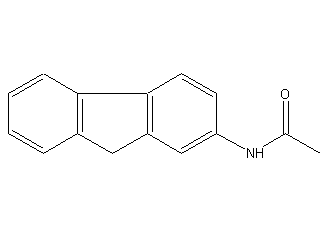
Structural formula
| Business number | 0165 |
|---|---|
| Molecular formula | C15H13NO |
| Molecular weight | 223.27 |
| label |
2-Acetamidofluoride, N-(2-fluorenyl)acetamide, 2-AAF, 2-Acetamidofluorene, N-Acetyl-2-aminofluorene, N-(2-Fluorenyl)acetamide, N-Fluoren-2-ylaccetamide |
Numbering system
CAS number:53-96-3
MDL number:MFCD00001116
EINECS number:200-188-6
RTECS number:AB9450000
BRN number:2807677
PubChem number:24891166
Physical property data
1. Properties: light yellow crystalline powder.
2. Density (g/mL, 25/4?): Undetermined
3. Relative vapor density (g/mL, air=1): Undetermined
4. Melting point (ºC): 194
5. Boiling point (ºC, normal pressure): Undetermined
6. Boiling point (ºC, 5.2kPa): Undetermined
7. Refractive index: Undetermined
8. Flash point (ºC): Undetermined
9. Specific rotation (º): Undetermined
10. Autoignition point or ignition temperature (ºC): Undetermined
11. Vapor pressure (kPa, 25ºC): Undetermined
12. Saturated vapor Pressure (kPa, 60ºC): Undetermined
13. Heat of combustion (KJ/mol): Undetermined
14. Critical temperature (ºC): Undetermined
15. Critical pressure (KPa): Undetermined
16. Log value of oil-water (octanol/water) partition coefficient: Undetermined
17. Explosion upper limit (%, V/V): Undetermined
18. Lower explosion limit (%, V/V): Undetermined
19. Solubility: Soluble in ethanol, ethylene glycol and fatty solvents, Insoluble in water.
Toxicological data
The median lethal dose (mice, oral) is 1020 mg/kg. Possibly carcinogenic.
Ecological data
None
Molecular structure data
1. Molar refractive index: 68.06
2. Molar volume (cm3/mol): 181.4
3. Isotonic specific volume (90.2K ): 490.5
4. Surface tension (dyne/cm): 53.4
5. Polarizability (10-24cm3): 26.98 p>
Compute chemical data
1. Reference value for hydrophobic parameter calculation (XlogP): None
2. Number of hydrogen bond donors: 1
3. Number of hydrogen bond acceptors: 1
4. Number of rotatable chemical bonds: 1
5. Number of tautomers: 3
6. Topological molecule polar surface area 29.1
7. Number of heavy atoms: 17
8. Surface charge: 0
9. Complexity: 301
10. Number of isotope atoms: 0
11. Determine the number of atomic stereocenters: 0
12. Uncertain number of atomic stereocenters: 0
13. Determine the number of chemical bond stereocenters Number: 0
14. Number of uncertain chemical bond stereocenters: 0
15. Number of covalent bond units: 1
Properties and stability
1. Extremely toxic if inhaled or in contact with skin and may cause cancer. When using it in large quantities, you should wear appropriate protective clothing, gloves, and protective gear or a mask. If you have an accident or feel uncomfortable during use, you should ask a doctor for diagnosis and treatment, and you should get special guidance before use.
Storage method
Save in a cool, dry place and away from light.
Synthesis method
None
Purpose
1. Organic synthesis. Studies on the carcinogenicity and mutagenicity of aromatic amines.
extended-reading:https://www.bdmaee.net/dibutyltin-monobutyl-maleate-cas-66010-36-4-bt-53c/extended-reading:https://www.bdmaee.net/nt-cat-tmbpa-catalyst-cas68479-98-1-newtopchem/extended-reading:https://www.newtopchem.com/archives/40325extended-reading:https://www.newtopchem.com/archives/44070extended-reading:https://www.bdmaee.net/fascat4200-catalyst-dibutyltin-diacetate-arkema-pmc/extended-reading:https://www.cyclohexylamine.net/catalyst-a33-polyurethane-catalyst-a33/extended-reading:https://www.bdmaee.net/pc-cat-np60-hard-foam-catalyst-dimethylbenzylamine-nitro/extended-reading:https://www.morpholine.org/delayed-catalyst-for-foaming-dabco-dc2-polyurethane-catalyst-dabco-dc2/extended-reading:https://www.newtopchem.com/archives/44916extended-reading:https://www.bdmaee.net/nt-cat-t1-catalyst-cas77-58-7-newtopchem/

